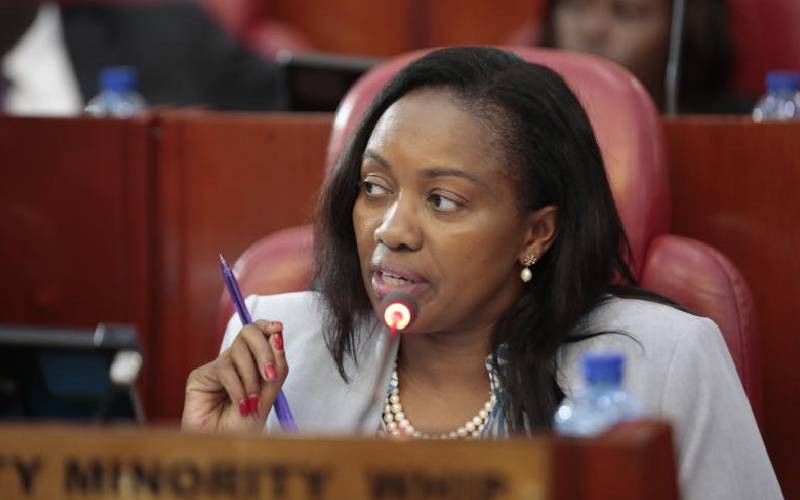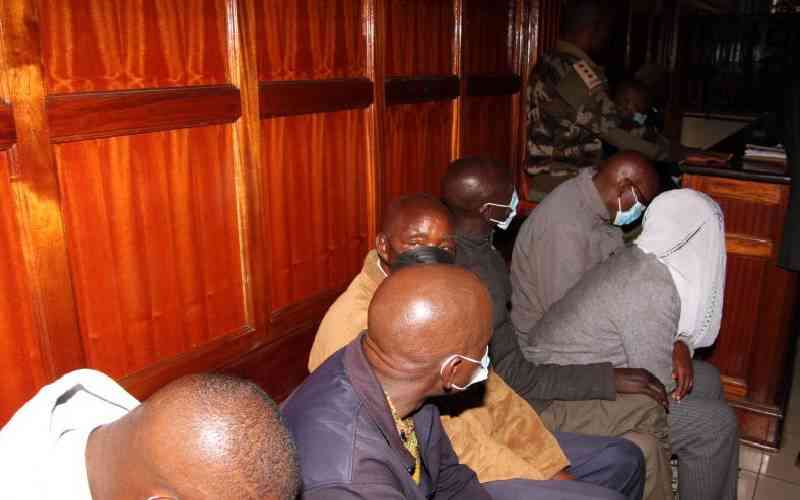
Just days after Nakuru Governor Susan Kihika returned to the country from an extended stay in the United States, a petition has been filed in court seeking her removal from office.
The petitioner, Peter Kuria Mwaniki, is seeking an urgent declaration from the Constitutional and Human Rights Division of the High Court that Kihika is unfit to hold office on the grounds that she holds dual citizenship, Kenyan and American.
“A declaration be issued that Kihika is not a fit and proper person with due regard to her honesty, dignity, personal integrity, and suitability, and hence, her election was inconsistent with the Constitution and invalid,” Mwaniki says in the petition.
He is also seeking an order declaring the seat of Governor for Nakuru County vacant and paving the way for the swearing in of her deputy David Kones as the governor.
The lawsuit filed under a certificate of urgency names Kihika as the first respondent, the United Democratic Alliance (UDA) party as the second respondent, and the Independent Electoral and Boundaries Commission (IEBC) as the third.




Mwaniki, a voter in Nakuru County, claims that Kihika’s past employment as an Assistant District Attorney in Dallas County, Texas a job “exclusively reserved for US citizens,” is undeniable proof that she holds American citizenship.
Citing Article 78(2) of the Constitution, which disqualifies dual citizens from holding state office unless they have renounced their foreign citizenship, Mwaniki argues that Kihika’s election was unconstitutional.
Through his lawyer Omar Siraji of Omar Siraji & Company Advocates, Mwaniki argues that her continued service as governor is a flagrant violation of the Constitution, which prohibits individuals holding dual citizenship from holding state office.
“This Honourable Court should take judicial notice that under Texas law, only US citizens can serve as Assistant District Attorneys. Kihika’s appointment to that position proves she holds American citizenship,” reads part of the petition.
“The District Attorneys are equivalent to prosecutors in our Kenyan context and are always citizens of those countries they serve… It is a requirement to be a citizen for one to become a prosecutor in Kenya, and the same is true for most of the world due to the sensitivity of the duties of a prosecutor.”
The petitioner claims Kihika did not renounce her US citizenship before vying for the governor’s seat in the 2022 General Election and that she has refused to clarify the matter despite a formal request.
“No public record exists showing that Kihika has ever formally renounced her US citizenship,” Mwaniki says.
“I wrote to the governor asking for any documentary evidence showing she had renounced her American citizenship. She declined to respond. Her silence on this matter speaks volumes and constitutes a gross breach of public trust,” Mwaniki states in his affidavit.
Mwaniki is also accusing IEBC of neglecting its constitutional mandate under Article 88 to vet candidates.
Stay informed. Subscribe to our newsletter
He terms the IEBC’s “oversight” as “a serious dereliction of duty” that undermines the credibility of future elections.
“The IEBC neglected its obligation under Article 88 to verify her eligibility. This failure not only undermines the 2022 elections but risks compromising future ones,” Mwaniki argues.
“This is not a small oversight it’s a direct threat to the integrity of our democracy.”
Article 78(2) of the Constitution states: “A person is not eligible for election or appointment to a State office unless the person is a citizen of Kenya and does not hold dual citizenship.”
Mwaniki also invokes Chapter Six of the Constitution on leadership and integrity, arguing that the matter goes beyond technical qualifications and speaks to trust in public office.
He alleges that Kihika’s continued tenure poses “a present and continuing danger” to Nakuru County and the sovereignty of Kenya.
“Leadership is a public trust. The Constitution demands honesty, integrity, and undivided loyalty. Kihika’s continued stay in office, while allegedly owing allegiance to a foreign country, is a breach of this sacred trust,” the petition reads.
The petition goes on to warn that the case is a matter of national importance, especially as the country approaches the 2027 general elections.
“If left unchecked, this violation will set a dangerous precedent. It will tell future leaders that constitutional requirements can be flouted without consequence,” Mwaniki adds.
He seeks a court declaration that Kihika is ineligible to hold the office of Governor and an order compelling her immediate removal, and a directive requiring the IEBC to take stricter vetting measures in future elections.
Mwaniki also wants the IEBC compelled to enforce strict vetting procedures in future elections.
The petitioner also seeks a declaration that the nomination and election of Kihika were unconstitutional, null, and void.
The lawsuit seeking Kihika’s ouster comes amid growing public frustration over her long absence for several months.
While she was away, Nakuru County was gripped by a wave of petitions and protests questioning her whereabouts and leadership.
At one point, over 2,000 residents submitted a petition to the County Assembly demanding an explanation for her absence.
“The governor must choose between managing her US law firm and serving the people of Nakuru. We demand transparency and accountability now,” a resident said.
Kihika’s return also coincides with intensifying criticism of her administration over management of the healthcare system.
The criticism intensified following the death of Elizabeth Wairimu, a young mother who died shortly after giving birth at the Margaret Kenyatta Mother and Baby Unit. Her family has accused the hospital of negligence.